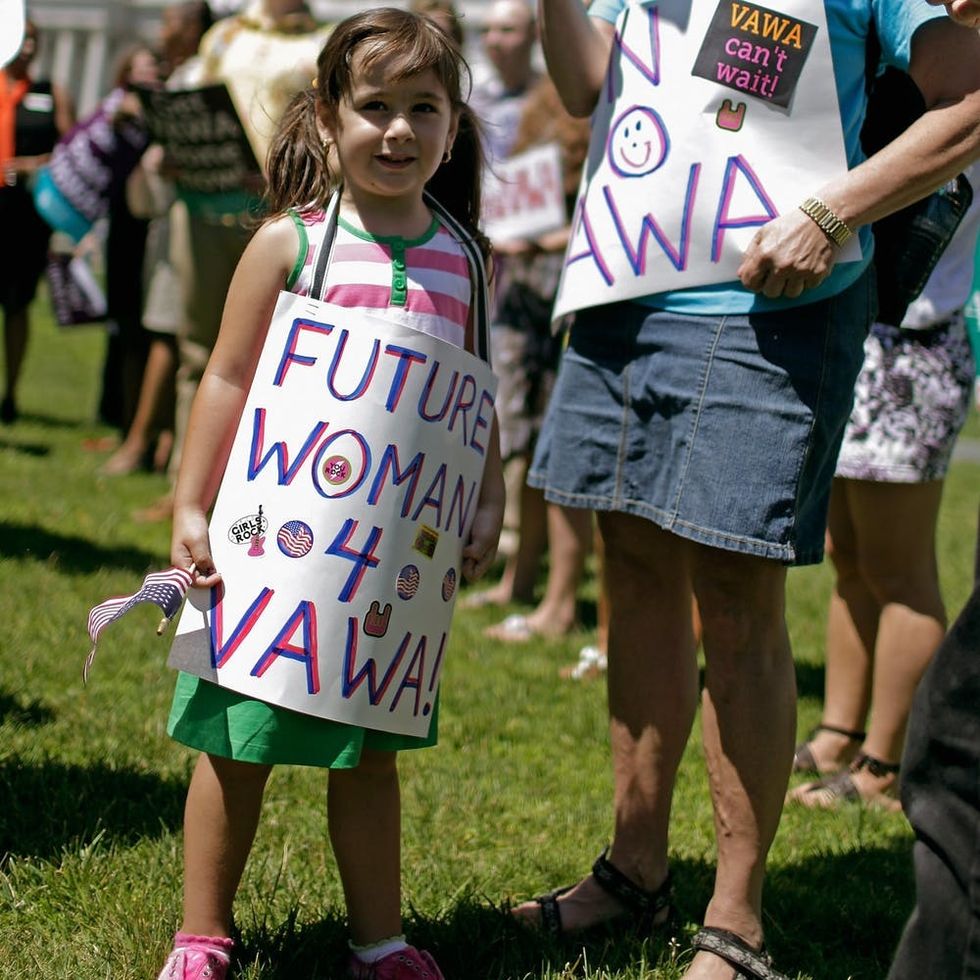Here’s what to expect if the 24-year-old law fails to be reauthorized by Congress.
The Violence Against Women Act Could Expire in September

With summer fading and fall on the horizon, Congress will soon reconvene from recess and it’s safe to say that they’ll have their hands full. In addition to the Senate confirmation of Supreme Court nominee Brett Kavanaugh that’s set to begin on September, another critical women’s issue will also be on the table: the Violence Against Women Act, also known as VAWA, is set to expire at the end of that month. In order to save it, Congress must pass a 2018 version of the bill that was introduced by House Democrats shortly before recess. There’s growing concern that this might not happen.

What does VAWA do?
The Violence Against Women Act, also known as VAWA, was introduced by then-Senator Joe Biden and signed by former President Bill Clinton in 1994. In addition to mandating and creating funding for crucial resources for survivors of sexual violence, it also had the transformative cultural impact of recognizing domestic abuse and sexual assault as serious crimes — a legacy that, as the #MeToo movement has shown over the past year, remains just as relevant today.
Some of the resources offered by VAWA include funding for rape kits, community violence prevention programs, and grants and funding for legal aid and resources to survivors displaced by abusers. VAWA also led to the creation of the National Domestic Violence Hotline.
VAWA’s influence has been significant. According to the Department of Justice, reports of domestic violence against women fell by 21 percent between 1993 and 1998. In addition, the DOJ would later find that reported incidences of sexual violence against girls and women older than 12 dropped by 64 percent between 1995 and 2005.
But other key statistics reveal just how necessary VAWA remains. Today, one in three women and one in four men have been victims of some form of physical violence by an intimate partner. And, despite a substantial decrease in reported rape since 1990, between 2013 and 2016, reported rapes in the US increased by around 17 percent. (We also know that a decisive majority of about 80 percent of assaults go unreported for a litany of reasons, which can include trauma and anxiety, fear of law enforcement, and, of course, fear of being blamed or disbelieved.)
While VAWA did not sweepingly stop violence against women, its provision of funding for rape kits and programs for sexual assault prevention, among other key community resources, brought a once buried systemic issue into the mainstream. More than two decades before #MeToo, it marked a crucial first step for empowering women and survivors of violence to talk about and seek remedy for their experiences.
What’s different about the 2018 version of the bill?
A 2018 version of the bill was introduced to Congress in late July by Texas Representative Sheila Jackson Lee, prior to summer recess. It places critical emphasis on preventing gun violence and removing firearms from domestic abusers; guns are the most common weapon used in domestic homicides.
The most recent reauthorized version of VAWA was signed into law by former President Obama in 2013 and includes specific initiatives to address campus sexual assault, reduce homicide and gun violence targeting domestic abuse victims, and address sexual violence that disproportionately targets Native American women, LGBTQ+ people, and people with disabilities.
Why are people worried that VAWA won’t be reauthorized this time around?
VAWA has previously been renewed in 2000, 2005 and 2013 with bipartisan support. But the 2018 version has yet to have a Republican co-sponsor, and as recently as 2013, 22 Republican senators opposed the legislation specifically because of its added protections for immigrant women and LGBTQ+ people.

In other words, contentious struggle across party lines over the reauthorization of the VAWA is a likely possibility this September. But despite the explosive politicization of the dialogue around sexual violence in the Trump and #MeToo era, it bears reminding that the VAWA and advocacy for survivors of abuse has never been, and can never be, about politics or political party, but fundamental human rights.
Though VAWA isn’t perfect, losing it would jeopardize the lives of many women, LGBTQ+ people, people of color, and people with disabilities, who are disproportionately targeted by sexual violence. If its latest version fails in Congress, it’s almost certain that the bill will emerge as a huge fight for Democrats in the November midterm elections.
(Photos by Chip Somodevila/Getty)

















